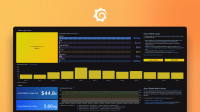Caution
Grafana Alloy is the new name for our distribution of the OTel collector. Grafana Agent has been deprecated and is in Long-Term Support (LTS) through October 31, 2025. Grafana Agent will reach an End-of-Life (EOL) on November 1, 2025. Read more about why we recommend migrating to Grafana Alloy.
Important: This documentation is about an older version. It's relevant only to the release noted, many of the features and functions have been updated or replaced. Please view the current version.
prometheus.exporter.postgres
The prometheus.exporter.postgres component embeds
postgres_exporter for collecting metrics from a postgres database.
Multiple prometheus.exporter.postgres components can be specified by giving them different
labels.
Usage
prometheus.exporter.postgres "LABEL" {
data_source_names = DATA_SOURCE_NAMES_LIST
}Arguments
The following arguments are supported:
| Name | Type | Description | Default | Required |
|---|---|---|---|---|
data_source_names | list(secret) | Specifies the Postgres server(s) to connect to. | yes | |
disable_settings_metrics | bool | Disables collection of metrics from pg_settings. | false | no |
disable_default_metrics | bool | When true, only exposes metrics supplied from custom_queries_config_path. | false | no |
custom_queries_config_path | string | Path to YAML file containing custom queries to expose as metrics. | "" | no |
The format for connection strings in data_source_names can be found in the official postgresql documentation.
See examples for the custom_queries_config_path file in the postgres_exporter repository.
NOTE: There are a number of environment variables that are not recommended for use, as they will affect all prometheus.exporter.postgres components. A full list can be found in the postgres_exporter repository.
Blocks
The following blocks are supported:
| Hierarchy | Block | Description | Required |
|---|---|---|---|
| autodiscovery | autodiscovery | Database discovery settings. | no |
autodiscovery block
The autodiscovery block configures discovery of databases, outside of any specified in data_source_names.
The following arguments are supported:
| Name | Type | Description | Default | Required |
|---|---|---|---|---|
enabled | bool | Whether to autodiscover other databases | false | no |
database_allowlist | list(string) | List of databases to filter for, meaning only these databases will be scraped. | no | |
database_denylist | list(string) | List of databases to filter out, meaning all other databases will be scraped. | no |
If enabled is set to true and no allowlist or denylist is specified, the exporter will scrape from all databases.
If autodiscovery is disabled, neither database_allowlist nor database_denylist will have any effect.
Exported fields
The following fields are exported and can be referenced by other components.
| Name | Type | Description |
|---|---|---|
targets | list(map(string)) | The targets that can be used to collect exporter metrics. |
For example, the targets can either be passed to a discovery.relabel
component to rewrite the targets’ label sets, or to a prometheus.scrape
component that collects the exposed metrics.
The exported targets will use the configured in-memory traffic address specified by the run command.
Component health
prometheus.exporter.postgres is only reported as unhealthy if given
an invalid configuration.
Debug information
prometheus.exporter.postgres does not expose any component-specific
debug information.
Debug metrics
prometheus.exporter.postgres does not expose any component-specific
debug metrics.
Examples
Collect metrics from a PostgreSQL server
This example uses a prometheus.exporter.postgres component to collect metrics from a Postgres
server running locally with all default settings:
// Because no autodiscovery is defined, this will only scrape the 'database_name' database, as defined
// in the DSN below.
prometheus.exporter.postgres "example" {
data_source_names = ["postgresql://username:password@localhost:5432/database_name?sslmode=disable"]
}
prometheus.scrape "default" {
targets = prometheus.exporter.postgres.example.targets
forward_to = [prometheus.remote_write.demo.receiver]
}
prometheus.remote_write "demo" {
endpoint {
url = PROMETHEUS_REMOTE_WRITE_URL
basic_auth {
username = USERNAME
password = PASSWORD
}
}
}Replace the following:
PROMETHEUS_REMOTE_WRITE_URL: The URL of the Prometheus remote_write-compatible server to send metrics to.USERNAME: The username to use for authentication to the remote_write API.PASSWORD: The password to use for authentication to the remote_write API.
Collect custom metrics from an allowlisted set of databases
This example uses a prometheus.exporter.postgres component to collect custom metrics from a set of
specific databases, replacing default metrics with custom metrics derived from queries in /etc/agent/custom-postgres-metrics.yaml:
prometheus.exporter.postgres "example" {
data_source_names = ["postgresql://username:password@localhost:5432/database_name?sslmode=disable"]
// This block configures autodiscovery to check for databases outside of the 'database_name' db
// specified in the DSN above. The database_allowlist field means that only the 'frontend_app' and 'backend_app'
// databases will be scraped.
autodiscovery {
enabled = true
database_allowlist = ["frontend_app", "backend_app"]
}
disable_default_metrics = true
custom_queries_config_path = "/etc/agent/custom-postgres-metrics.yaml"
}
prometheus.scrape "default" {
targets = prometheus.exporter.postgres.example.targets
forward_to = [prometheus.remote_write.demo.receiver]
}
prometheus.remote_write "demo" {
endpoint {
url = PROMETHEUS_REMOTE_WRITE_URL
basic_auth {
username = USERNAME
password = PASSWORD
}
}
}Replace the following:
PROMETHEUS_REMOTE_WRITE_URL: The URL of the Prometheus remote_write-compatible server to send metrics to.USERNAME: The username to use for authentication to the remote_write API.PASSWORD: The password to use for authentication to the remote_write API.
Collect metrics from all databases except for a denylisted database
This example uses a prometheus.exporter.postgres component to collect custom metrics from all databases except
for the secrets database.
prometheus.exporter.postgres "example" {
data_source_names = ["postgresql://username:password@localhost:5432/database_name?sslmode=disable"]
// The database_denylist field will filter out those databases from the list of databases to scrape,
// meaning that all databases *except* these will be scraped.
//
// In this example it will scrape all databases except for the one named 'secrets'.
autodiscovery {
enabled = true
database_denylist = ["secrets"]
}
}
prometheus.scrape "default" {
targets = prometheus.exporter.postgres.example.targets
forward_to = [prometheus.remote_write.demo.receiver]
}
prometheus.remote_write "demo" {
endpoint {
url = PROMETHEUS_REMOTE_WRITE_URL
basic_auth {
username = USERNAME
password = PASSWORD
}
}
}Replace the following:
PROMETHEUS_REMOTE_WRITE_URL: The URL of the Prometheus remote_write-compatible server to send metrics to.USERNAME: The username to use for authentication to the remote_write API.PASSWORD: The password to use for authentication to the remote_write API.



